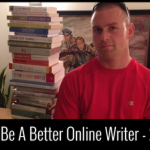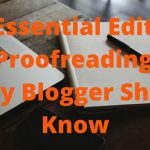
Do you care whether anyone reads your blog?
Seems like a stupid question. Of course, you care. You wouldn’t be writing if you didn’t – at least, that’s what I presume.
But ask yourself, or better yet, ask your readers (if you dare) whether they can tell, by your writing, whether you care to keep them interested, or whether your aim is solely to get your information out there.
If you want to be a dangerous blogger – the kind who is read regardless of what they’re saying, the kind of blogger where readers come for engaging material – then read on.
What Does Your Opening Say About You?
You’ve drafted the article, you’ve crafted a killer headline that just begs, “click me!” but… what happened then?
If your opening is dry, your work will be for naught.
If you jump right into cold hard facts and statistics your information will lose your reader’s attention.
If you lose momentum or don’t give them what they came for, they’ll know that you can’t be bothered with anything more than instruction. If they’re not engaged, challenged, entertained, or provoked to think, they’ll drop away from your post like leaves from a tree in autumn.
Don’t Be Afraid to Shock Them
The one time you can safely jump into information without preamble is when you have an exciting, shocking, juicy bit of information.
If your article or post has a particularly exciting, shocking, or juicy revelation in it, put it first.
Cut out the fluff from the existing introduction, make your surprising announcement, and then explain what it means for your readership afterward.
News outlets and tabloid magazines do this all the time, not because they’re incredibly eager to get us the most important bits first.
They do it because it’s so surprising to have something important just thrown at us that we become (almost) instantly spellbound.
Tell A Story
When I was in grade school, I literally used the words, “This paper is going to be about _____” in my assignments. The followup was almost as bad, as the end usually said, “In summary, this paper was about ______.”
Don’t embarrass yourself by being so painstakingly clear.
Too many novice writers introduce their material in a similar style, and it’s a surefire way to lose everyone’s attention.
Starting with a story, be it personal or otherwise, is an introduction that draws readers in and prepares them for what comes next.
The story can be used throughout the work to draw parallels, or it can simply open the door for your main point. How you use it is up to you.
Keep The Momentum Going
Whether your title is quippy, provocative, or deadly serious, you must carry that throughout your opening.
If you flash a word like “Danger!” in your headline, you’d better have content that grips your readers’ by the eyes and forces them to keep reading.
If you’ve promised a numbered list, don’t waste time by writing paragraph after paragraph about the information you’re about to present.
No one expects there to be pertinent information in the introduction, so it’s up to you to surprise them and make the opening as valuable as the article itself.
The bottom line here is that you will lose readers on a bait ‘n’ switch. Keep the energy consistent and deliver on your headline’s promise, and they’ll keep coming back for more.
Question Everything
Is it wrong that I hate, but still use, rhetorical question?
Business bloggers in particular are terrible at introducing a post without posing a handful of rhetorical questions to their readership.
Any idea why that is?
It’s because it works.
Questions have two purposes.
The first is to cause your readers to pause and think, and then read on in hopes that they were right.
The second is to lead them down a path. You can use questions to start your readers’ saying yes, and feeling they agree with you.
Don’t abuse this. I’ve seen articles introduced by a dozen consecutive, rhetorical, and obvious questions. If you overdo it, try to simplify. Instead of making a statement ending in a sarcastic, “right?”, try condensing your handful of queries down to one, solid question that packs a powerful punch.
If you can do that, you’ll have mastered a skill that many others have failed.
You can sprinkle questions, analogies, anecdotes, and statistics through your work, but they will have no larger impact than when they’re used in an introduction.
Keep your writing clean, develop your voice, and start using these tips in your blog immediately. Your readers will notice, I guarantee it.















